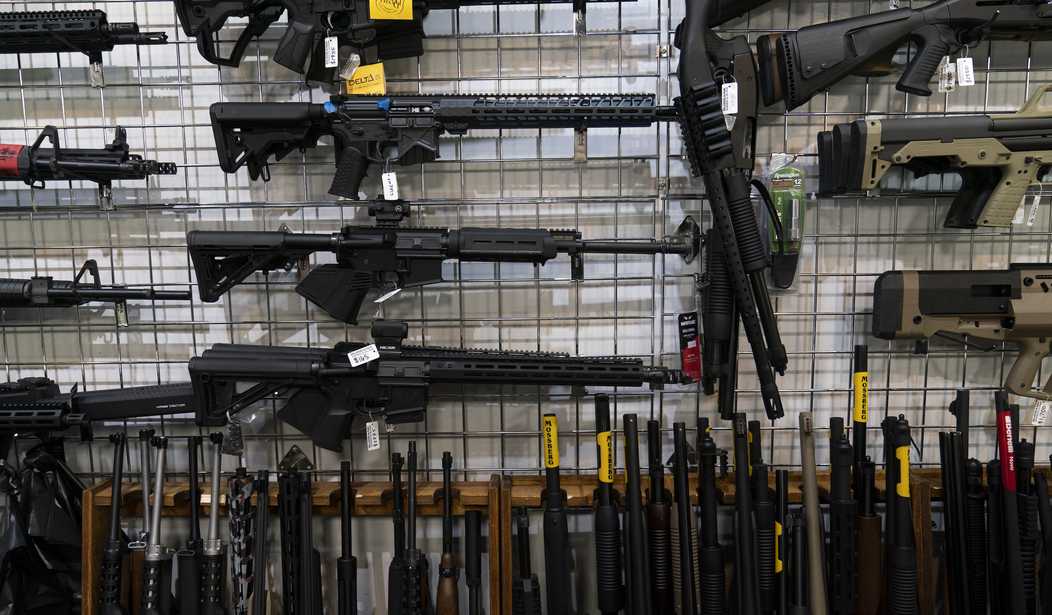We have classified the Hearing Protection Act and the SHORT Act as pro-gun measures. This is because they're good for gun owners, good for gun buyers, and expand our options at the local gun store by making it possible to just walk in with cash and walk out with one of these items.
That classification, however, is our own. That's the way we see it.
Yet these bills are being attacked as a violation of the Senate's so-called Byrd Rule, where anything in a budget-related bill has to be budget-related.
Seems like a fair rule, but the problem is that these folks are sort of trying to play both sides when it comes to the National Firearms Act, as Second Amendment attorney Kostas Moros noted on X on Tuesday.
At this point everyone following the NFA debate is well aware of then-Attorney General Cummings’ famous testimony in which he justified the NFA as a tax measure. When asked how the NFA “escaped” the Second Amendment, Cummings replied:
— Kostas Moros (@MorosKostas) June 24, 2025
“Oh, we do not attempt to escape it. We are…
Post continues:
"Oh, we do not attempt to escape it. We are dealing with another power, namely, the power of taxation, and of regulation under the interstate commerce clause. You see, if we made a statute absolutely forbidding any human being to have a machine gun, you might say there is some constitutional question involved. But, when you say, “We will tax the machine gun” and when you say that “the absence of a license showing payment of the tax has been made indicates that a crime has been perpetrated,” you are easily within the law.”
In anticipation of the Parliamentarian’s imminent ruling on whether the HPA and SHORT Act provisions merged into the reconciliation bill survive the Byrd rule, below are a bunch of cases over the years from the Supreme Court and federal circuit courts also saying clearly that the NFA is a TAX. They prove that the government has long defended the NFA in court as a tax. Several plaintiffs and petitioners challenging the NFA over the years including in some of the cases listed below, even argued the NFA is not really a tax but rather a regulation, so it should be struck down. Courts rejected that argument.
The NFA can’t now conveniently be characterized as something other than a tax because it suits the powers that be of Gun Control Inc. If the Parliamentarian rules against our side on this, she should be ignored. It would be an utterly partisan ruling. Taxes can be eliminated via reconciliation, as taxes are inherently budgetary measures.
If the NFA was allowed to live for so long because it was a tax, it can be killed in reconciliation because it is a tax. No eleventh hour convenient recharacterizations should be tolerated.
“Petitioner does not deny that Congress may tax his business as a dealer in firearms. He insists that the present levy is not a true tax, but a penalty imposed for the purpose of suppressing traffic in a certain noxious type of firearms, the local regulation of which is reserved to the states because not granted to the national government. . . But a tax is not any the less a tax because it has a regulatory effect. . . Here the annual tax of $200 is productive of some revenue. We are not free to speculate as to the motives which moved Congress to impose it, or as to the extent to which it may operate to restrict the activities taxed. As it is not attended by an offensive regulation, and since it operates as a tax, it is within the national taxing power.”
Sonzinsky v. United States, 300 U.S. 506, 512-514 (1937).
“Section 5851 forms part of the National Firearms Act, an interrelated statutory system for the taxation of certain classes of firearms. . . We do not doubt, as we have repeatedly indicated, that this Court must give deference to Congress' taxing powers, and to measures reasonably incidental to their exercise. . ..”
Haynes v. United States, 390 U.S. 85, 87, 98 (1968).
“As we stated above, the NFA is part of a comprehensive scheme to levy and collect taxes upon the making and transfer of certain firearms. The NFA's regulatory provisions need only bear a “reasonable relation” to the statute's taxing purpose.”
United States v. Aiken, 974 F.2d 446, 448 (4th Cir. 1992)
“To the contrary, it is well-settled that § 5861(d) is constitutional because it is ‘part of the web of regulation aiding enforcement of the transfer tax provision in § 5811. Having required payment of a transfer tax and registration as an aid in collection of that tax, Congress under the taxing power may reasonably impose a penalty on possession of unregistered weapons.’"
United States v. Gresham, 118 F.3d 258, 262 (5th Cir. 1997) (citing United States v. Ross, 458 F.2d 1144, 1145 (5th Cir.1972)).
There's a whole thread, and Kostas makes it pretty clear that it's been viewed by the courts and supporters as a tax, at least when convenient.
For the usual suspects to then turn it around and make the argument that now it's an essential gun safety measure is asinine. Not when it's long been defended in the courts as a tax.
If it's not a tax, then it needs to be treated as a gun control law in the courts and defended as such. You can't play both sides and pretend that it's Schrodinger's law, both a tax and a safety measure, until someone looks, then it's whatever it needs to be at that moment.
And let's be real here, the repeal of Prohibition did more to stop gangland violence than the NFA did. The fact that we're hearing about "Glock switches" taking over our streets makes it pretty clear the NFA isn't actually stopping bad people from getting these weapons, which means it's definitely not a safety bill...or at least one that works.
As a tax, it is what it is, and considering the NFA is basically a shall-issue thing for anyone with $200, more or less, that sure looks more like a tax anyway.
For all the handwringing out there, it's pretty clear how this has been defended in the courts. It fits most of what we see with the NFA.
And honestly, short-barreled rifles and shotguns were never the preferred weapon of the gangster. They were in there to prevent circumvention of the law when the bill included handguns. Those were forgotten about, though, when handguns were pulled from an earlier draft of the bill, and no one thought about them.
Suppressors are more of an artifact of Hollywood than any real threat to the American people, so they were included.
Yet in this day and age, anyone who wants to can have either of these without any real trouble. Of course, they always could. There's been a ton of ways around the law, up to and including using a good old hacksaw on your shotgun.
Moros provides a ton of documentation in his thread showing how this has long been viewed. He also notes in his final post there that this wasn't a comprehensive review by any stretch. It's just a taste of what's in the records, and that's important, because he provides a buttload.
Anti-gunners need to shut up on this, because they're wrong at every level.








Join the conversation as a VIP Member